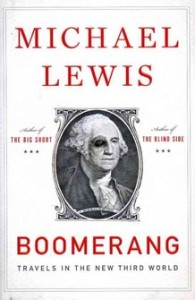 On Fresh Air today, Berkeley author Michael Lewis discusses his new book, Boomerang: The Meltdown Tour. You can listen to the segment or read the transcript here. According to Forbes, the book is "a collection of financial-disaster reports from Iceland, Ireland, Greece, Germany and California," tales of fiscal recklessness that led to the debt crisis threatening entire sovereign economies.
On Fresh Air today, Berkeley author Michael Lewis discusses his new book, Boomerang: The Meltdown Tour. You can listen to the segment or read the transcript here. According to Forbes, the book is "a collection of financial-disaster reports from Iceland, Ireland, Greece, Germany and California," tales of fiscal recklessness that led to the debt crisis threatening entire sovereign economies.
You can read the California chapter -- called California and Bust -- in this month's Vanity Fair. The intro to the piece:
The smart money says the U.S. economy will splinter, with some states thriving, some states not, and all eyes are on California as the nightmare scenario. After a hair-raising visit with former governor Arnold Schwarzenegger, who explains why the Golden State has cratered, Michael Lewis goes where the buck literally stops—the local level, where the likes of San Jose mayor Chuck Reed and Vallejo fire chief Paige Meyer are trying to avert even worse catastrophes and rethink what it means to be a society.
One of the people Lewis interviews is Meredith Whitney, "a private Wall Street analyst...who, back in 2007, had gone from being obscure to famous when she correctly suggested that Citigroup’s losses in U.S. subprime bonds were far bigger than anyone imagined, and predicted the bank would be forced to cut its dividend."
The states that had enjoyed the biggest boom were now facing the biggest busts. “How does the United States emerge from the credit crisis?” Whitney asked herself. “I was convinced—because the credit crisis had been so different from region to region—that it would emerge with new regional strengths and weaknesses. Companies are more likely to flourish in the stronger states; the individuals will go to where the jobs are. Ultimately, the people will follow the companies.” The country, she thought, might organize itself increasingly into zones of financial security and zones of financial crisis. And the more clearly people understood which zones were which, the more friction there would be between the two. (“Indiana is going to be like, ‘N.F.W. I’m bailing out New Jersey.’ ”) As more and more people grasped which places had serious financial problems and which did not, the problems would only increase. “Those who have money and can move do so,” Whitney wrote in her report to her Wall Street clients, “those without money and who cannot move do not, and ultimately rely more on state and local assistance. It becomes effectively a ‘tragedy of the commons.’ ”
The point of Meredith Whitney’s investigation, in her mind, was not to predict defaults in the municipal-bond market. It was to compare the states with one another so that they might be ranked. She wanted to get a sense of who in America was likely to play the role of the Greeks, and who the Germans. Of who was strong, and who weak. In the process she had, in effect, unearthed America’s scariest financial places.
“So what’s the scariest state?” I asked her.
She had to think for only about two seconds.
“California.”